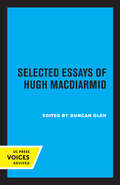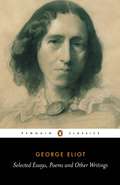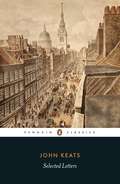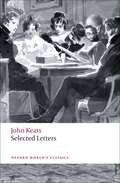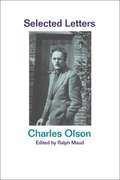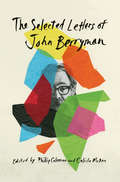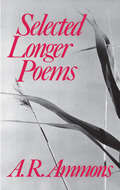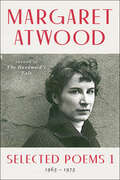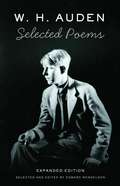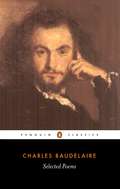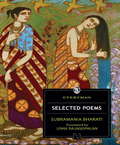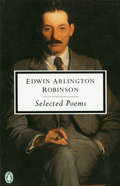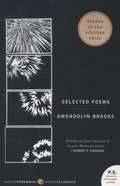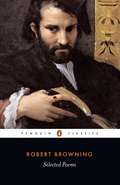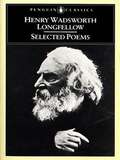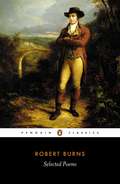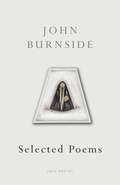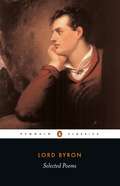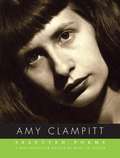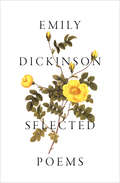- Table View
- List View
Selected Essays of Hugh MacDiarmid
by Hugh MacDiarmidThis title is part of UC Press's Voices Revived program, which commemorates University of California Press’s mission to seek out and cultivate the brightest minds and give them voice, reach, and impact. Drawing on a backlist dating to 1893, Voices Revived makes high-quality, peer-reviewed scholarship accessible once again using print-on-demand technology. This title was originally published in 1969.
Selected Essays, Poems and Other Writings
by A. S. Byatt George EliotThe works collected in this volume provide an illuminating introduction to George Eliot's incisive views on religion, art and science, and the nature and purpose of fiction. Essays such as 'Evangelical Teaching' show her rejecting her earlier religious beliefs, while 'Woman in France' questions conventional ideas about female virtues and marriage, and 'Notes on Form in Art' sets out theories of idealism and realism that she developed further in Middlemarch and Daniel Deronda. It also includes selections from Eliot's translations of works by Strauss and Feuerbach that challenged many ideas about Christianity; excerpts from her poems; and reviews of writers such as Wollstonecraft, Goethe and Browning. Wonderfully rich in imagery and observations, these pieces reveal the intellectual development of this most challenging and rewarding of writers.
Selected Letters: The Complete Poems And Selected Letters (Collins Classics Ser.)
by John Keats'I am certain of nothing but the holiness of the heart's affections, and the truth of imagination' - Keats, in a letter to his friend Benjamin Bailey in November 1817.In a period of great letter-writing, Keats's letters are outstanding. They begin in summer 1816, as he approached his twenty-first birthday, and were written over the next four years until his early death. Viewed together, they give the fullest and most poignant record we have of Keats's ambitions and hopes as a poet, his life as a literary man about town, his close relationship with his brothers and young sister, and, later, his passionate, jealous and frustrated love for Fanny Brawne.Keats enclosed many of his poems with his letters, and read together, they offer an incomparable insight into his creative process and development as a poet. This major new edition edited by Professor John Barnard includes an introduction and notes, as well as a map of Keats's Scottish walking tour and reproductions of his letters.John Keats was born in October 1795. His Poems appeared in 1817, while Endymion was published in 1818, both to mixed reviews. In 1819 he wrote The Eve of St Agnes, La Belle Dame sans Merci, the major odes, Lamia and the Fall of Hyperion. Keats was already unwell when preparing his 1820 volume for the press; by the time it appeared in July he was desperately ill. He died in Rome in 1821, in a rented apartment next to the Spanish Steps, at the age of twenty-five.John Barnard is Emeritus Professor of English Literature at the University of Leeds and has edited The Complete Poems of Keats for Penguin Classics.
Selected Letters
by John Keats Robert Gittings Jon Mee'Do you not see how necessary a World of Pains and troubles is to school an Intelligence and make it a soul?' Keats's letters have long been regarded as an extraordinary record of poetic development and soulmaking. They represent one of the most sustained reflections on the poet's art we have from any of the major English poets. Yet quite apart from the light they throw on the poetry, they are great works of literature in their own right. Written with gusto and occasionally painful candour, they show a powerful intelligence struggling to come to terms with its own mortality. Sometimes bitterly jealous in love and socially and financially insecure, at others playful and confident of his own greatness, Keats interweaves his personal plight with the history of a Britain emerging from the long years of the Napoleonic Wars into a world of political unrest, profound social change, and commercial expansion. This selection of 170 letters, written between 1816 and 1820, includes a new introduction and notes by Jon Mee explaining both the personal and political contexts that brought them to life.
Selected Letters
by Charles OlsonIn this volume, nearly 200 letters, selected from a known 3,000, demonstrate the wide range of Olson's interests and the depth of his concern for the future which includes letters to friends and loved ones, job and grant applications, letters of recommendation, and Black Mountain College business letters, as well as correspondence illuminating Olson's poetics. The letters which span from 1931 to his death in 1970 portrays a fascinating picture of this complex poet and thinker.
The Selected Letters of John Berryman
by John BerrymanA wide-ranging, first-of-its-kind selection of Berryman’s correspondence with friends, loved ones, writers, and editors, showcasing the turbulent, fascinating life and mind of one of America’s major poets.The Selected Letters of John Berryman assembles for the first time the poet’s voluminous correspondence. Beginning with a letter to his parents in 1925 and concluding with a letter sent a few weeks before his death in 1972, Berryman tells his story in his own words.Included are more than 600 letters to almost 200 people—editors, family members, students, colleagues, and friends. The exchanges reveal the scope of Berryman’s ambitions, as well as the challenges of practicing his art within the confines of the publishing industry and contemporary critical expectations. Correspondence with Ezra Pound, Robert Lowell, Delmore Schwartz, Adrienne Rich, Saul Bellow, and other writers demonstrates Berryman’s sustained involvement in the development of literary culture in the postwar United States. We also see Berryman responding in detail to the work of writers such as Carolyn Kizer and William Meredith and encouraging the next generation—Edward Hoagland, Valerie Trueblood, and others. The letters show Berryman to be an energetic and generous interlocutor, but they also make plain his struggles with personal and familial trauma, at every stage of his career.An introduction by editors Philip Coleman and Calista McRae explains the careful selection of letters and contextualizes the materials within Berryman’s career. Reinforcing the critical and creative interconnectedness of Berryman’s work and personal life, The Selected Letters confirms his place as one of the most original voices of his generation and opens new horizons for appreciating and interpreting his poems.
Selected Longer Poems
by A. R. AmmonsReaders already familiar with Ammons’s longer mode in other books will welcome this new collection, while those familiar only with the shorter poems will find their appreciation of his work both deepened and heightened. The Selected Poems: 1951-1977 was described by one critic as “an indispensable book”; Selected Longer Poems is an indispensable companion to it. The distinguished poet A. R. Ammons once described himself as, “not so much looking for the shape as being available to any shape that may be summoning itself through me from the self not mine but ours.” This “availability” has enabled his poetic genius to be at home in forms raging from brief lyrics—the best of which he brought together in The Selected Poems: 1951-1977—all the way to poems of full book length.
Selected Poems
by Ai QingA timeless, visionary collection of poems from one of China&’s most acclaimed poets—now available in English for the first time in a generation and featuring a foreword by his son, contemporary artist and activist Ai WeiweiOne of the most influential poets in Chinese history, Ai Qing is mostly unknown to American readers, but his work has shaped the nature of poetry in China for decades. Born between the fall of imperial Manchurian rule and the establishment of the Communist People&’s Republic, Ai Qing was at one time an intimate of Mao Zedong. He would eventually fall out with the leader and be sentenced to hard labor during the Cultural Revolution, when he was exiled to the remote part of the country known as &“Little Siberia&” with his family, including his son, Ai Weiwei. In his work, Ai Qing tells the story of a China convulsing with change, leaving behind a legacy of feudalism and imperialism but uncertain about what the future will hold. Breaking with traditional forms of Chinese poetry, Ai Qing innovatively adapted free verse, writing with a simple sincerity in clear lines that could be understood by everyday readers. Selected Poems is an extraordinary collection that traces the powerful inner life of this influential poet who crafted poems of protest, who longed for a newer, happier age, and who wrote with a profound lyricism that reaches deep into the heart of the reader.
Selected Poems
by James ApplewhiteJames Applewhite has produced nine extraordinary books of poetry. This volume is the first anthology of his remarkable oeuvre. It brings together chronologically arranged selections from all of his previous books, from the first, published in 1975, through the most recent, published in 2002. Applewhite's poetry is deeply rooted in the history and rhythms of rural North Carolina, where he was born and raised, and these poems mark stages in an artistic and personal journey he has undertaken over the past thirty years. In impeccable and surprising language, Applewhite depicts the social conventions, changes, frictions, and continuities of small southern towns. He celebrates that which he values as decent and life-enhancing, and his veneration is perhaps most apparent in his response to the natural world, to the rivers and trees and flowers. Yet Applewhite's love for his native land is not straightforward. His verse chronicles his conflicted feelings for the region that gave him the initial, evocative language of place and immersed him in a blazing sensory world while it also bequeathed the distortions, denials, and prejudices that make it so painful a labyrinth. Rendering troubled legacies as well as profound decency, Applewhite reveals the universally human in a distinctively local voice, within dramatic and mundane moments of hope and sorrow and faith.
Selected Poems: 1965-1975
by Margaret AtwoodCelebrated as a major novelist throughout the English-speaking world, Atwood has also written eleven volumes of poetry. Houghton Mifflin is proud to have published SELECTED POEMS, 1965-1975, a volume of selections from Atwood's poetry of that decade.
Selected Poems
by W. H. Auden Edward MendelsonThis significantly expanded edition of W. H. Auden's Selected Poems adds twenty poems to the hundred in the original edition, broadening its focus to better reflect the enormous wealth of form, rhetoric, tone, and content in Auden's work. Newly included are such favorites as "Funeral Blues" and other works that represent Auden's lighter, comic side, giving a fuller picture of the range of his genius. Also new are brief notes explaining references that may have become obscure to younger generations of readers and a revised introduction that draws on recent additions to knowledge about Auden. As in the original edition, the new Selected Poems makes available the preferred original versions of some thirty poems that Auden revised later in life, making it the best source for enjoying the many facets of Auden's art in one volume.
Selected Poems: Selected Poems And Prose
by Charles-Pierre BaudelaireThe poems of Charles Baudelaire are filled with explicit and unsettling imagery, depicting with intensity every day subjects ignored by French literary conventions of his time. 'Tableaux parisiens' portrays the brutal life of Paris's thieves, drunkards and prostitutes amid the debris of factories and poorhouses. In love poems such as 'Le Beau Navire', flights of lyricism entwine with languorous eroticism, while prose poems such as 'La Chambre Double' deal with the agonies of artistic creation and mortality. With their startling combination of harsh reality and sublime beauty, formal ingenuity and revolutionary poetic language, these poems, including a generous selection from Les Fleurs du Mal, show Baudelaire as one of the most influential poets of the nineteenth century.
Selected Poems
by Subramania Bharati Usha RajagopalanIn the melody that is heard all day long In the teeming city and in nature's wilderness In all these notes I have lost myself.' Honoured at a public function when he was a mere boy of eleven with the title 'Bharati' (one blessed by Saraswati the Goddess of Learning) C. Subramania Bharati (1882-1921) is renowned as the herald of the renaissance of Tamil literature. The simplicity and lyricism that marked his poetry reflect a clear shift in sensibility and craft from the classical tradition which had adhered to strictures of style, imagery and language for over 2000 years. Ranging from the fiercely patriotic and the deeply romantic to the humbling intensity of devotion and the sharp criticism of self and society, this selection brings together poems that reflect the very essence of Bharati's broad philosophy. Usha Rajagopalan's stellar translations echo the lyricism and transformative power that have lent Bharati's poetry their distinctive enduring quality.
Selected Poems
by Robert Bringhurst"Robert Bringhurst may well be the poet we have all been waiting for, one who can reclaim for poetry the dignity, wit, brilliance, and wisdom it has recently appeared to have mislaid. He is without doubt a major poet, not only in the context of Canadian letters, but in that of all writing of our time."-PoetryInspired by Eastern, pre-Socratic, and Native American art and ideas, Robert Bringhurst's Selected Poems gathers work from fifteen volumes and embodies music, ecology, mythology, and philosophy. As he writes, "When you think intensely and beautifully, something happens." Bringhurst's passion for books and words extends to the design and typography of this gorgeous volume."Essay on Adam"There are five possibilities. One: Adam fell.Two: he was pushed. Three: he jumped. Four:he only looked over the edge, and one look silenced him.Five: nothing worth mentioning happened to Adam.The first, that he fell, is too simple. The fourth,fear, we have tried. It is useless. The fifth,nothing happened, is dull. The choices are these:he jumped or was pushed. And the difference between themis only an issue of whether the demonswork from the inside out or from the outsidein: the onetheological question.Robert Bringhurst is a poet, typographer, and linguist, well known for his award-winning translations of Haida storytellers. His manual The Elements of Typographic Style is one of the world's most influential texts on typographic design. He lives on Quadra Island, British Columbia.
Selected Poems
by Joseph Brodsky Edwin Arlington Robinson Robert FaggenEdwin Arlington Robinson's finely crafted, formal rhythms mirror the tension the poet sees between life's immutable circumstances and humanity's often tragic attempts to exert control. At once dramatic and witty, his poems lay bare the loneliness and despair of life in genteel small towns ("Tilbury Down" and "The Mill"), the tyranny of love ("Eros Turrannos" and "The Unforgiven"), and unspoken, unnoticed suffering ("The Wandering Jew", and "Isaac and Archibald"). In addition, the fictional characters he created in "Reuben Bright", "Miniver Cheevy", "Richard Cory", and the historical figures he brought to life -- Lincoln in "The Master" and the great painter in "Rembrandt to Rembrandt" -- harbor demons and passions the world treats with indifference or cruelty. With an Introduction that sheds light on Robinson's influence on poets from Eliot and Pound to Frost and Berryman, this collection brings an unjustly neglected poet to new readers.
Selected Poems
by Gwendolyn BrooksThe classic volume by the distinguished modern poet, winner of the 1950 Pulitzer Prize, and recipient of the National Book Foundation Medal for Distinguished Contribution to American Letters, showcases an esteemed artist's technical mastery, her warm humanity, and her compassionate and illuminating response to a complex world.
Selected Poems
by Robert BrowningRobert Browning was one of the greatest of English poets, whose intense and original imagination enabled him to transform any subject he chose - whether everyday or sublime - into startling memorable verse. In his work he brought to life the personalities of a diverse range of characters, and introduced a new immediacy, colloquial energy and psychological complexity to the poetry of his day. This selection brings together verse ranging from early dramatic monologues such as the chilling 'My Last Duchess' and the ribald 'Fra Lippo Lippi', which show his gift for inhabiting the mind of another, to the popular children's poem 'The Pied Piper of Hamelin' and many lesser known works. All display his innovative techniques of diction, rhythm and symbol, which transformed Victorian poetry and influenced major poets of the twentieth century such as Ezra Pound, T. S. Eliot and Robert Frost.
Selected Poems
by Lawrence Buell Henry Wadsworth LongfellowLongfellow was the most popular poet of his day. This selection includes generous samplings from his longer works--Evangeline, The Courtship of Miles Standish, and Hiawatha--as well as his shorter lyrics and less familiar narrative poems.
Selected Poems
by Robert BurnsThis selection gives equal weight to the two aspects of Robert Burns's reputation, as a lyricist and as a much-loved Scottish poet. Placing works in probable order of composition, it includes lyrics to his most well known songs, such as the nostalgic Auld Lang Syne, the romantic A Red, Red Rose, and the patriotic Scots What Hae. As a poet, Burns wrote with deceptive simplicity and imaginative sympathy, and demonstrated enormous range - from comic dramatic monologues such as Holy Willie's Prayer, which mocks hypocrisy, to narratives including the celebrated Tam O' Shanter, about the ghostly visions of a drunk.
Selected Poems
by John BurnsideOver seventeen years and nine collections, John Burnside has built - in the words of Bernard O'Donoghue - 'a poetic corpus of the first significance', a poetry of luminous, limpid grace. His territory is the no-man's-land of threshold and margin, the charmed half-light of the liminal, a domestic world threaded through with mystery, myth and longing. In this Selected Poems we can see themes emerge and develop within the growing confidence of Burnside's sinuous lyric poise: the place of the individual in the world, the idea of dwelling, of home, within that community, and the lure of absence and escape set against the possibilities of renewal and continuity.This is consummate, immaculate work born out of a lean and agile craftsmanship, profound philosophical thought and a haunted, haunting imagination; the result is a poetry that makes intimate, resonant, exquisite music.
Selected Poems
by Lord ByronDescribed as 'Mad, bad and dangerous to know' by one of his lovers, Lady Caroline Lamb, Lord Byron was the quintessential Romantic. Flamboyant, charismatic and brilliant, he remains almost as notorious for his life - as a political revolutionary, sexual adventurer and traveller - as he does for his literary work. Yet he produced some of the most daring and exuberant poetry of the Romantic age, from 'To Caroline' and 'To Woman' to the satirical English Bards and Scotch Reviewers, his exotic Eastern tales and the colourful narrative of Childe Harold's Pilgrimage, the work that made him famous overnight and gave birth to the idea of the brooding Byronic hero.
Selected Poems
by Christopher Carduff John Updike Brad LeithauserThough John Updike is widely known as one of America's greatest writers of prose, both his first book and his last were poetry collections, and in the fifty years between he published six other volumes of verse. Now, six years after his death, Christopher Carduff has selected the best from Updike's lifework in poetry: 129 witty and intimate poems that, when read together in the order of their composition, take on the quality of an unfolding verse-diary.Among these poems are precocious undergraduate efforts (including the previously unpublished "Coming into New York"), frequently anthologized midcareer classics ("Seagulls," "Seven Stanzas at Easter," "Dog's Death"), and dozens of later works in a form that Updike made his own, the blank-verse sonnet. The poems range from metaphysical epigrams and devotional poems to lyrical odes to rot, growth, and healing; from meditations on Roman portrait busts and the fleshy canvases of Lucian Freud to observations on sash cords, postage stamps, and hand tools; from several brief episodes in family history to a pair of long autobiographical poems, the antic and eclectic "Midpoint," written at age thirty-five, and the elegiac masterpiece "Endpoint," completed just before his death at seventy-six. The variety of the work is astonishing, the craftsmanship always of the highest caliber.Art, science, popular culture, foreign travel, erotic love, the beauty of the man-made and the God-given worlds--these recurring topics provided Updike ever-surprising occasions for wonder and matchless verbal invention. His Selected Poems is, as Brad Leithauser writes in his introduction, a celebration of American life in the second half of the twentieth century: "No other writer of his time captured so much of this passing pageant. And that he did so with brio and delight and nimbleness is another reason to celebrate our noble celebrant."
Selected Poems
by Amy Clampitt Mary Jo SalterWhen Amy Clampitt's first collection, The Kingfisher, was published, it was hailed as that rare first book that "signals a major poet in full bloom" (Los Angeles Times). Its author was sixty-three years old. Over the next eleven years, Clampitt produced four additional, major collections. Now, the most essential poems from these five volumes are gathered together.Clampitt was an impassioned observer of the natural world, the delights of which color many of these poems: writing of the fog, she described "a stuff so single / it might almost be lifted, / folded over, crawled underneath / or slid between, as nakedness- / caressingsheets." Such was the texture of her language, too. She was a traveler, reporting back from England and Greece, from California and Maine, and from her native Midwest. An Iowa transplant to New York, the descendant of pioneers, she wrote of prairies and subways; of the movements of wildflowers, people, and ideas; and of the widespread modern experience of uprootedness.Here is a treasure of Amy Clampitt's verse, for those who are reading her for the first time, as well as for those who have long admired her.From the Trade Paperback edition.
Selected Poems
by E. E. Cummings Richard S. Kennedy"No one else has ever made avant-garde, experimental poems so attractive to both the general and the special reader."--Randall Jarrell The one hundred and fifty-six poems here, arranged in twelve sections and introduced by E. E. Cummings's biographer, Richard S. Kennedy, include his most popular poems, spanning his earliest creations, his vivacious linguistic acrobatics, up to his last valedictory sonnets. Also featured are thirteen drawings, oils, and watercolors by Cummings, most of them never before published. Adjusting type size may change line breaks. Landscape mode may help to preserve line breaks.
Selected Poems: Emily Dickinson Poems Selected By Anne Car (Bcl1-ps American Literature Ser.)
by Emily DickinsonA collection of poems by &“one of America&’s greatest and most original poets of all time&” (Poetry Foundation). One of the nineteenth century&’s leading poets, Emily Dickinson wrote nearly 1,800 poems during her lifetime, though only a handful were published. This collection includes some of Dickinson&’s best-known works, reflecting her thoughts on nature, life, death, the mind, and the spirit. &“Emily Dickinson is one of our most original writers, a force destined to endure in American letters. . . . Without elaborate philosophy, yet with irresistible ways of expression, Emily Dickinson&’s poems have true lyric appeal, because they make abstractions, such as love, hope, loneliness, death, and immortality, seem near and intimate and faithful.&” —The Atlantic &“Emily Dickinson did not leave any poetics or treatise to explain her life&’s work, so we can come to her poetry with minds and hearts open, and unearth whatever it is we need to find. Her oeuvre is a large one and most of her work was done in secret—she didn&’t share most of what she wrote. Ten or so poems were published in her lifetime, mostly without her consent. She often included poems with letters but, after her death, the poet&’s sister Vinnie was surprised to find almost eighteen hundred individual poems in Dickinson&’s bedroom, some of them bound into booklets by the poet.&” —Publishers Weekly &“Dickinson found love, spiritual quickening and immortality, all on her own terms.&” —The Guardian
